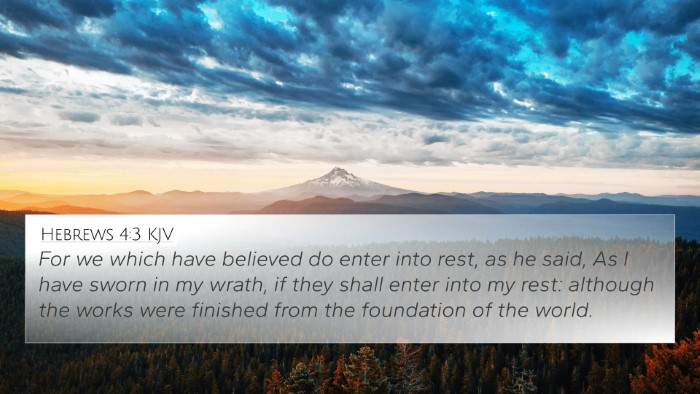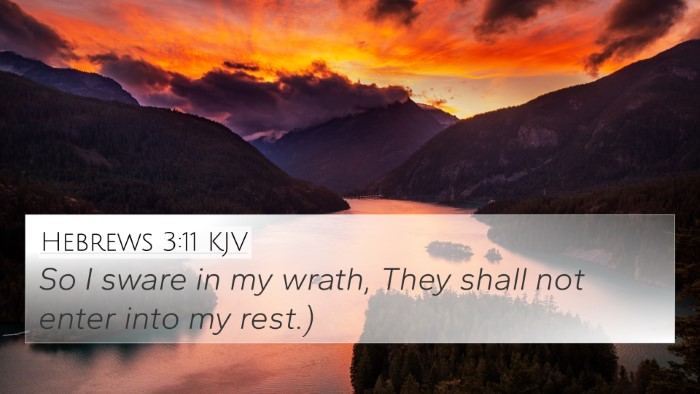Old Testament
Genesis Exodus Leviticus Numbers Deuteronomy Joshua Judges Ruth 1 Samuel 2 Samuel 1 Kings 2 Kings 1 Chronicles 2 Chronicles Ezra Nehemiah Esther Job Psalms Proverbs Ecclesiastes Song of Solomon Isaiah Jeremiah Lamentations Ezekiel Daniel Hosea Joel Amos Obadiah Jonah Micah Nahum Habakkuk Zephaniah Haggai Zechariah MalachiHebrews 4:5 Similar Verses
Hebrews 4:5 Cross References
And in this place again, If they shall enter into my rest.
Uncover the Rich Themes and Topics of This Bible Verse
Listed below are the Bible themes associated with Hebrews 4:5. We invite you to explore each theme to gain deeper insights into the Scriptures.
Hebrews 4:5 Cross Reference Verses
This section features a detailed cross-reference designed to enrich your understanding of the Scriptures. Below, you will find carefully selected verses that echo the themes and teachings related to Hebrews 4:5 KJV. Click on any image to explore detailed analyses of related Bible verses and uncover deeper theological insights.

Hebrews 4:3 (KJV) »
For we which have believed do enter into rest, as he said, As I have sworn in my wrath, if they shall enter into my rest: although the works were finished from the foundation of the world.
Hebrews 4:5 Verse Analysis and Similar Verses
Understanding Hebrews 4:5
Hebrews 4:5 states: "And in this place again, If they shall enter into my rest." This verse builds upon the earlier discussions in Hebrews regarding rest, particularly the rest that God offers to His people. It emphasizes that the promise of entering God's rest still holds significance and requires careful consideration. Below, we explore the meanings derived from esteemed public domain commentaries.
Commentary Insights
-
Matthew Henry:
Henry interprets the concept of "rest" as a metaphorical entry into a state of divine peace and salvation. He highlights that this rest was not merely physical (like the land of Canaan) but spiritual and eternal. The reference indicates the ongoing opportunity for humanity to embrace God’s rest, which is often neglected due to disobedience or lack of faith.
-
Albert Barnes:
Barnes emphasizes the continuity of God's promise throughout Scripture and explains that the rest referred to in this verse connects back to the foundational principles of faith established in the Old Testament. He points out that the quotation of "If they shall enter into my rest," reiterates the necessity of faith and obedience in receiving God’s promises.
-
Adam Clarke:
Clarke brings attention to the relationship between this verse and the previous context regarding the disobedient Israelites. He notes the thematic ties back to Psalm 95, which warns against hardening one’s heart and missing out on the divine rest due to unbelief. Clarke suggests the verse serves as both a reminder and a warning to believers concerning their relationship with God.
Thematic Connections and Cross-References
This verse interconnects with various themes throughout Scripture, such as the promise of rest, faithfulness, and obedience to God. Below are key cross-references that support its meaning:
- Exodus 33:14: "My presence will go with you, and I will give you rest." This verse highlights God’s promise of rest to His people.
- Psalm 95:7-11: A direct parallel warning against hardening our hearts, which is crucial for entering into rest.
- Matthew 11:28-30: Jesus invites the weary to find rest in Him, linking the concept of rest back to the New Covenant.
- Romans 4:3: "Abraham believed God, and it was counted unto him for righteousness," reinforcing the need for faith to enter into rest.
- Hebrews 3:11: Another scripture reiterating the warning of entering into God’s rest.
- 1 Peter 1:5: "Who are kept by the power of God through faith unto salvation ready to be revealed in the last time," reflecting the enduring nature of God’s promise.
- Revelation 14:13: "Blessed are the dead which die in the Lord... they may rest from their labors," which ties the promise of rest back to eternal life.
- Isaiah 28:12: "This is the rest wherewith you may cause the weary to rest; and this is the refreshing," highlighting the necessity of divine rest for the soul.
Importance of Cross-Referencing
Cross-referencing Bible verses is crucial for a deeper understanding of Biblical texts. By examining connections between different scriptures, one can unveil thematic dimensions and gain profound insights into God’s word. Here are some suggested methods and tools for effective cross-referencing:
- Bible Concordance: Utilize a concordance to find word-based connections across various scriptures.
- Bible Cross-Reference Guide: A structured guide can assist in locating pertinent verses that relate to specific themes or teachings.
- Cross-Reference Bible Study Methods: Engage in comparative studies; for example, examine similar teachings in the Old and New Testaments.
- Bible Reference Resources: Leverage various biblical commentaries and theological works that illuminate connections between scriptures.
Conclusion
Hebrews 4:5 serves as a reminder of the ongoing offer of divine rest that God extends to His people. Through analytical insights from Matthew Henry, Albert Barnes, and Adam Clarke, alongside relevant cross-references, believers can gain a deeper appreciation of the spiritual rest promised by God. By understanding these connections in Scripture, one can further explore the profound truths present in the Bible and strengthen their faith as they learn to enter into God's rest.




